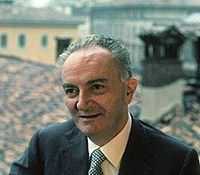Michele Sindona
| Michele Sindona | |
|---|---|
 | |
| Born |
May 8, 1920 Patti, Sicily, Kingdom of Italy (1861–1946) |
| Died |
March 22, 1986 (aged 65) Voghera, Italy |
| Nationality | Italian |
| Occupation | Banker |
Michele Sindona (May 8, 1920 - March 22, 1986) was an Italian banker and convicted felon. Known in banking circles as "The Shark", Sindona was a member of Propaganda Due (#0501),[1] a secret lodge of Italian Freemasonry, and had clear connections to the Sicilian Mafia. He was fatally poisoned in prison while serving a life sentence for the murder of lawyer Giorgio Ambrosoli.
Biography
Early years
Born at Patti, Sicily, of poor parents, Michele Sindona was educated by the Jesuits, showing very early in his life an unusual aptitude for mathematics and economics. He graduated with a law degree from the University of Messina in 1942. Then he moved from Sicily to the north where he worked as a tax lawyer and an accountant for companies such as Società Generale Immobiliare and Snia Viscosa, but immediately turned away from the law and began working in smuggling operations with the Mafia.[citation needed] He soon moved to Milan and his skill and dexterity in transferring money to avoid taxation soon became known to Mafia bosses. By 1957 he had become closely associated with the Gambino family and was chosen to manage their profits from heroin sales.
International banker
Within a year of the Gambino family choosing him to manage their heroin profits, Sindona had bought his first bank. He also became a friend of future Pope Giovanni Battista Montini who was at the time Cardinal of the Archdiocese of Milan. By the time Montini became Pope, Sindona had acquired, through his holding company Fasco, many more Italian banks and his progress continued right up to the beginning of his association with the Vatican Bank in 1969. Huge amounts of money moved from Sindona's banks through the Vatican to Swiss banks, and he began speculating against major currencies on a large scale.[citation needed]
In 1972, Sindona purchased a controlling interest in Long Island's Franklin National Bank. He was hailed as "the saviour of the lira" and was named "Man of the Year" in January 1974 by US ambassador to Italy, John Volpe. But that April a sudden stock market crash led to what is known as Il Crack Sindona. The Franklin Bank's profit fell by as much as 98% compared to the previous year, and Sindona suffered a 40 million dollar loss, with the result that he began losing most of the banks he had acquired over the previous seventeen years. On October 8, 1974, the bank was declared insolvent due to mismanagement and fraud, involving losses in foreign currency speculation and poor loan policies.[2]
According to the Mafia pentito Francesco Marino Mannoia, Sindona laundered the proceeds of heroin trafficking for the Bontade-Spatola-Inzerillo-Gambino network. The mafiosi were determined to get their money back and would play an important role in Sindona's attempt to save his banks.[3]
Arrest, trial and death
On July 11, 1979, Giorgio Ambrosoli, the lawyer who was commissioned as liquidator of Sindona's banks, was murdered in Milan. Milanese Councilman Antonio Amati turned the case over to a young judge, Giuliano Turone. It was discovered that Michele Sindona ordered Ambrosoli's murder (which was carried out by an American assassin). At the same time the Mafia killed police superintendent Boris Giuliano in Palermo. He was investigating the Mafia’s heroin trafficking and had contacted Ambrosoli just two weeks before to compare investigations. [citation needed]
While under indictment in the US, Sindona pretended to have been kidnapped in August 1979 to conceal a mysterious 11-week trip to Sicily before his scheduled fraud trial. The brother-in-law of Mafia boss Stefano Bontade, Giacomo Vitale, was one of the persons who organized Sindona’s travel. The real purpose of the kidnapping was to issue thinly-disguised blackmail notes to Sindona’s past political allies – among them Prime Minister Giulio Andreotti – to engineer the rescue of his banks and recover Cosa Nostra’s money.[citation needed]
He threatened Enrico Cuccia, president of the Mediobanca who was opposed to the reorganization/rescue plan.[4] In Palermo, Sindona went to the house of Dr. Joseph Miceli Crimi, an American-Italian doctor and Freemason. Crimi later admitted to the judges that he went to Arezzo to talk with Licio Gelli about Sindona's situation. Licio Gelli then started to interest two judges, Giuliano Turone and Gherardo Colombo.
The plot failed. After his supposed release from the kidnappers Sindona surrendered to the FBI. He was convicted in 1980 in the United States on 65 counts, including fraud, perjury, false bank statements and misappropriation of bank funds. He was represented by one of the nation's leading attorneys, Ivan Fisher. While he was serving time in US Federal Prison, the Italian government applied for the extradition of Sindona back to Italy to stand trial for murder. "The Shark" was sentenced to 25 years in Italian prison on March 27, 1984. On March 18, 1986, he was poisoned with cyanide in his coffee, in his cell at the prison in Voghera while serving a life sentence for the murder of Giorgio Ambrosoli.[5]
References
- ↑ "Web of scandal entangles P2". The Times. 1981-05-27.
- ↑ Account Settled, Time magazine, April 7, 1980
- ↑ (Italian) Anche Antonino Giuffré nell'inchiesta Calvi, La Repubblica, October 13, 2002
- ↑ Messina and Arico v. United States of America, United States Court of Appeals, February 7, 1984
- ↑ Michele Sindona, Jailed Italian Financier, Dies of Cyanide Poisoning at 65, The New York Times, March 23, 1986
Sources
- Yallop, David (1984). In God's Name: An Investigation Into The Murder of Pope John Paul I. Jonathan Cape.
- Tosches, Nick (1986). Power on Earth. Arbor House.
- DiFonzo, Luigi (1983). St. Peter's Banker. Franklin Watts..
External links
- Article (in Italian) on Propaganda Due
- A Forcibly Retired Moneyman, Time, September 13, 1982
|